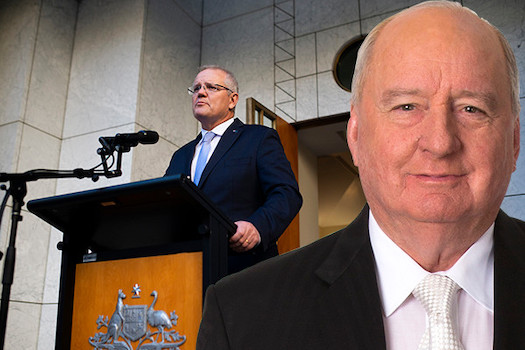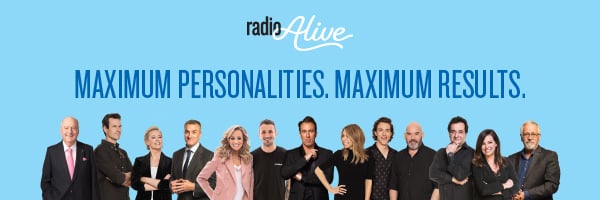Comment from Peter Saxon
While Alan Jones was celebrating the defeat of Labor and its leader Bill Shorten at the recent federal election amid a bevy of wrong predictions and faulty data, he came up with his own analysis; that in 32 years, no political leader that had refused to appear on his program during an election campaign has gone on to take government.
While that may be true, appearing on his 2GB breakfast show has not necessarily assured political success either.
The last time Alan Jones had a Labor leader on his show, it did not go well for said Labor leader. It was just a few months ago that Michael Daley, in search of an election winning moment to become NSW Premier, ventured where progressive angels fear to tread, into Alan Jones’ 2GB studio.
Daley, under no illusion that he was likely to be filleted like a flathead at the fish market, came prepared. Armed with the adage that attack is the best form of defence he took Jones on and, for a moment stunned him like a mullet.
Jones had been on the board of the SCG for some 30 years and was instrumental in convincing the Liberal government that it was necessary to rebuild both the Sydney Football Stadium at Moore Park and the Olympic stadium at Homebush for a total close to two billion dollars. Labor campaigned on a policy of “schools and hospitals before stadiums.”
In a heated exchange on March 5, this year, Daley told Jones, “If I’m elected, the board will go, I want a new broom through. I know you’ve been on that board for 30 years … but the board will go, it will be sacked.”
Believing he had Jones on the ropes, Daley left him with a parting shot, “Alan, thanks for your service.”
It’s never a good idea to be shut in a small, soundproof room with a 450 kilo gorilla and poke him in the eye.
Less than three weeks later the Liberal Berejiklian government was swept back in to power and the prematurely presumptive premier, Michael Daley, has not been heard of since.
Boycotting programs that have a perceived ideological difference to your party’s view has not been restricted to the Labor party.
In one of his last captain’s picks as PM, Tony Abbott, refused to appear on Q & A and banned all his ministers from it too because it was too left wing.
Then, having rolled Abbott for the leadership, Malcolm Turnbull refused to go on 2GB because it was too right wing.
Generally, though, it is Labor politicians that tend to boycott conservative talk shows. They see little value in being ambushed and brow beaten for the amusement of an audience that has no intention of voting for them no matter what they say.
Conservative talk presenters know that their audience has little interest in listening intently to a leftist politician’s policies. They’d rather the host give the pollie a kick in the pants on their behalf. Of course, nobody does it better than Alan Jones.
Yet, in 2016, just weeks before the federal election, Jones invited Bill Shorten onto his show and gave him the kind of treatment one would have expected from the ABC.
In contrast to the now infamous Julia Gillard interview of February 2011 in which he called her “Ju-liar”, the Shorten interview lacked the kind of personal attack usually reserved for Labor politicians.
Where the Gillard interview commenced with Jones scolding the then Prime Minister of Australia as if she were a tardy school girl for being 10 minutes late, his introduction for Mr Shorten was far more courteous, telling his audience, “He’s flat to the boards but the Opposition Leader, Bill Shorten, has agreed to give us some of his time this morning…”
In closing, Jones turned on the charm, saying to Shorten, “You will be pleased that I haven’t asked you a question on your emissions trading scheme. I’m wondering, if we could on another day, have a yarn about that and what that may do to the economy.” Shorten could but cordially reply, “Of course.”
The interview itself was tough but fair, focused entirely on policy – Jones was playing the ball – not the man.
I wrote at the time: “Perhaps this is an indication that Australia’s arch conservative station, or at least its foremost practitioner, was leaning towards the middle and is prepared to play politics with a straight bat. Or perhaps it’s more about giving Malcolm Turnbull a bit of a hurry-up by awarding his opponent a free kick.
“Mr Turnbull needs to get himself on the Alan Jones Breakfast show and fast. It is better for him to suffer the slings and arrows that will likely be tossed at him than avoid the issue and be seen as too weak and timid to be a leader.”
As it turned out, just days before the election, Turnbull finally went on the Jones breakfast show for a courteous, if somewhat icy, discussion and went on to scrape in for another term of Liberal government.
In my opinion, all politicians should make an effort to appear on all major media, regardless of political bent, at least once a year and again when an election has been called.
Why? Because you’ve been elected to govern for all of Australia, not just your fanbase, not just the people who voted, or are likely to vote, for you. That’s what you’re paid to do, dammit! And if that means you’ve got to get out of your comfortable echo chamber and be yelled at in the other side’s, then that’s just part of the job description. Call it an occupational hazard.
More than that, as slim as the pickings may be, there’s an opportunity to at least gain some respect for having the guts to turn up. Australians value that. If you can remain calm and retain some dignity you may just come out of it more respected than when you went in.
In the same way that true fans are important for radio stations, fans (as opposed to just voters) are vital for political parties because they determine the size of the primary vote going into an election. Nonetheless, because no party, in (my) living memory has been able to amass 50 per cent or more of the primary vote, elections are still decided by those in the middle and the preferences of fans of minor parties that can’t win a majority anyway.
In this era of complex issues where everything seems to be a trade-off, many of the voters in the middle are simply looking for the leader they can most trust to make the best decisions available to them and to do the “right thing” in the face of a raft of competing interests.
For some reason, according to poll after poll, the public never warmed to Bill Shorten. He consistently trailed the “Better PM” question by a long margin. That meant that Scott Morrison was always in with a chance to win it for the Libs, despite the fact that the party itself was being out-polled by Labor.
In the final days before the election, Scott Morrison was handed two opportunities, neither one of his making, to demonstrate why he might be the type of leader voters could rely on to do the “right thing.”
The first opportunity was the story published in the Daily Telegraph and Brisbane’s Courier Mail accusing Shorten of using the narrative of his working class mother sacrificing her ambition to study law so that her children got a good education but omitting the fact that in her 50’s she went on to realise her dreams – as if, somehow, that detracts from her enormous personal achievements and Bill Shorten’s credibility.
Genuinely shocked by the story, a teary-eyed Shorten was garnering a lot of sympathy from the other news outlets and voters on both sides of politics, including the PM.
Scott Morrison said he understood the hurt caused to Mr Shorten by the story.
“I mean, Bill lost his mother five years ago and I can understand that would have upset him a great deal. I can only extend my best wishes to him.
“This election is not about our families. It’s not about our mums or our dads or kids or our wives, as great as they are, it’s about the choice between Bill Shorten and myself as Prime Minister.
“And I know that Bill and I would very much want to keep focused on that choice, not on our families,” said Scott Morrison.
The second opportunity to come out of the blue was the death of Bob Hawke. Scott Morrison’s statement was more generous and from the heart than anyone on the Labor side, including Bill Shorten and Paul Keating, was able to express.
“Bob Hawke was a great Australian who led and served our country with passion, courage, and an intellectual horsepower that made our country stronger,” said Morrison in part of the statement. “We remember him for his unique capacity to speak to all Australians as one – from everyday battlers to business leaders. His larrikinism was a big part of that.”
If that’s a true reflection of what Scott Morrison admires and aspires to as Prime Minister, then it can only bode well for the country.
In looking for leadership, Australians respond to those who have the capacity to show generosity to their opponents when it is due. In my view Scott Morrison won a lot of votes among the undecided by instinctively doing the “right thing” when the circumstances called for it.
Wine lovers know that the richest grapes often come from the poorest soils… the fruit from vines that are forced to work the hardest. That’s why, for politicians, it’s worth sowing some seeds in the opposition’s camp even if it’s hard to endure. Or as they say in basketball, “You miss 100% of the shots you don’t take.”

Peter Saxon


